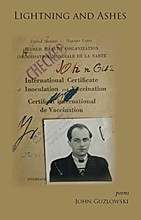
|
John Guzlowski's book, Lightning and Ashes, chronicles the lives of Guzlowski's parents in WWII and post-WWII Europe, where his mother and father were placed in labor camps and later filed away as Displaced Persons before eventually immigrating to The United States, where many of these poems are also based. In many ways the poems of this book are historical, political poems. Yet Lightning and Ashes also meditates on the connections between generations, from mother-to-son, father-to-daughter, and how the wires and signals of experience get crossed in good ways and bad. There's a temptation to consider or label Guzlowski's work plain, sparse, gray. But there's a reason for that. Because Lightning and Ashes attempts to answer a question not often posed by poetry nearly enough anymore: How does one utilize imagination in an effort to record terror, hostility, depravation, when experiences like those of Guzlowski's parents render metaphor and simile out of place, if not entirely useless? In light of this question, Guzlowski decides to let such devices take a backseat, not an easy thing for a poet to do, and lets the facts of the story do the work for him instead. Only on occasion do these poems employ tactful artifice. “German Soldiers Come to My Mother's Village,” for instance, marks a drastic shift in perspective as Guzlowski assumes the voice of a German soldier who tells us of a group of Poles:
The opening to “There Were No Miracles,” however, embodies the tact of the majority of this book:
At its best, Lightning and Ashes is a book concerned with lessons learned. Sometimes the learning may have taken half a lifetime, however, and most often it isn't a political or historical lesson. In “Chores” Guzlowski reflects on an exchange with his mother:
When his mother denies him, Guzlowski remember how:
Perhaps this is Guzlowski reflecting back on a lesson learned decades ago. Perhaps it's a reflection of a lesson learned only now, decades later. Either way, the moment has stuck with him, and for good reason, just as many of these poems stick with the reader. --Jay Robinson
|
